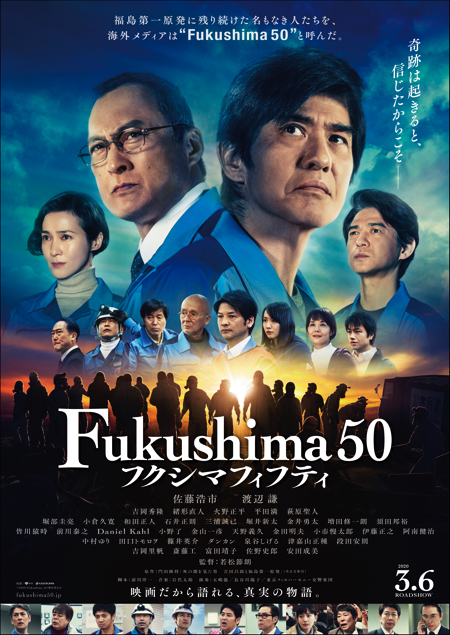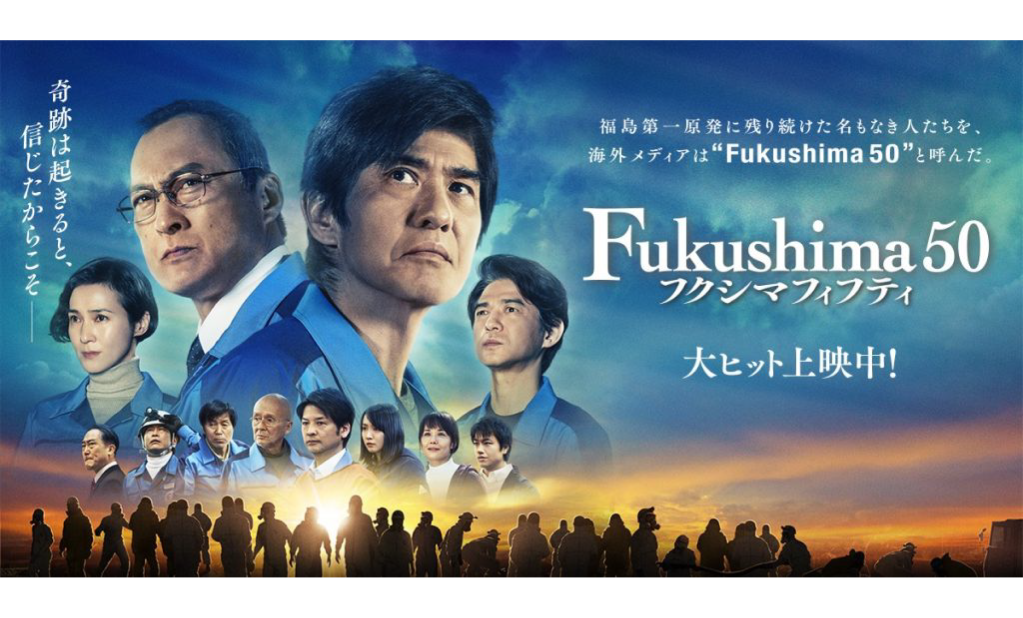On the film Fukushima 50 directed by Setsuro Wakamatsu

How does a film deal with what we hoped would be the sole natural disaster on that scale to hit Japan in the 21st century? How does it avoid saying there won’t be a next time? Fukushima 50 chooses to rely on an idea of filmmaking that brings together a J-drama esthetic and a ‘cinema’ ambition similar to that of disaster movie producer Irwin Allen. It tries to show what took place inside a nuclear plant on March 11th 2011: how 50 employees were able to avoid a nuclear catastrophe that would have been devastating, based on interviews with both politicians and workers with writer Ryusho Kadota. March 11 was the day of the Tohoku earthquake, the tsunami that followed, and the explosion of nuclear reactors.
The first thirty minutes of the film seem to announce an ambition which, while lacking in orginality, has the merit of following a path forged by Hideaki Anno’s Shin Godzilla and HBO series Chernobyl, by Craig Mazin and Johan Renck. It rapidly reveals the new Minshuto government’s lack of experience. Scene after scene, the film points to the inept decisions made or more often delayed by the ministers, as with Anno, while the first sequences inside the plant reveal the scale of what is at stake and recall the searing unspeakable anguish of Chernobyl when the workers get closer to the core as they attempt to release some of the pressure accumulated in the reactors. The flagrant absence of emergency scenarios plunges the narrative, and the film, within an abyss barely identified by the film: the hurried maintenance reports on the reliability of the plant that had been done by energy giant TEPCO. And so a lone figure will need to emerge from the chaos, at once able to stand up to the government and inspire his team. Masao Yoshida (Ken Watanabe) becomes this emblem of the Japanese worker who, back to the wall, uses his intelligence to disobey and refuse the state’s orders. Both corporate and government leaders feared the reactors would become useless in the future if sea water kept being used to cool them off. Yoshida persists and saves Japan from Tohoku to Tokyo.
Once this is established, Fukushima 50 takes another turn and becomes an actual contemporary Japanese film as it transforms into a sentimental tv dorama adding up tearful scenes of employees, their families as they’re evacuated from their homes, and a politician or two grasping what could become of Fukushima. We even run across Dankan, former regular in the early films of Takeshi Kitano (Boiling Point, Getting Any?) who has since become a tv drama staple, as a journalist from the stricken region on hand in Tokyo, imploring those in charge to provide an answer. Director Setsuro Wakamatsu, a television veteran, offers a sense of directing that appears exhausted after its first half hour, then aims to show the courage and a propensity for sacrifice found in most of those who make up Yoshida’s team. This is done through reaction shots from family members hearing reports, receiving a phone call from someone inside the plant, insisting on the spectator’s empathy which existed from the outset. In a further critique of the Minshuto government, Wakamatsu recalls throughout the film the country’s refusal to accept international assistance (the next government, which saw the ruling Jiminto party return to power, has maintained this course of thinking with the millions of contaminated liters of water it still has to reckon with), and the director, again like Anno, relies on a lazy practice of casting local foreigners in the roles of diplomats and journalists, while recreating international news bulletins seeping with errors of language…Unsurprisingly, America is particularly concerned and expresses its frustration through its ambassador and an officer in charge of a US military base in Japan who spent his childhood years in…Fukushima. The end of the film sees an armada of helicopters taking off, Coppola-like, for the stricken region in order to bring bottles of water to its people who welcome them with open arms as the true friends of the nation.
On the day of the press screening for the film, Japan still had not reached a decision about the 2020 Olympic Games, nor given any specific confinement recommendations. A luxury cruiser was the central source of concern. Masks were provided however to each press member with mandatory wearing. Fukushima 50, a Kadokawa production, is playing in movie theaters now in Tokyo, a city far more anxious. It might also recall that America had a different president in 2011.
S.
Mari Asano (Narumi Yasuda)
The feminist thinking has not taught us to find a feminist bone to pick with everything we come across. But it is impossible to notice the extremely unbalanced gender ratio in the working sphere in the film where there are hundreds of men from different offices yet only one woman. From the opening scene where the earthquake arrives, the film has made it clear that this only woman is professionally redundant through her standing at the door and repeatedly asking “are you alright” to every colleague running out from the building, instead of being substantially helpful by guiding the evacuation route or handing supplies or any other sort of support beyond the robotistic greeting. It’s revealed in the following two hours that that only female character at work, sharing the same office with the other male employees who are specialized in one field or another but would immediately stop whatever they are doing once for any pivotal phone call or quarrel in the room, has no specific profession but being there for her male colleagues to provide emotional support or clean up the restroom as a middle-aged, good-looking and soothing babysitter, housekeeper, potential lover, or mascot. If that depiction is based on the reality like many other plots are supposed to be, Tokyo Electric Power Company’s Human Resources Department needs to be educated better.
Z.


Leave a comment